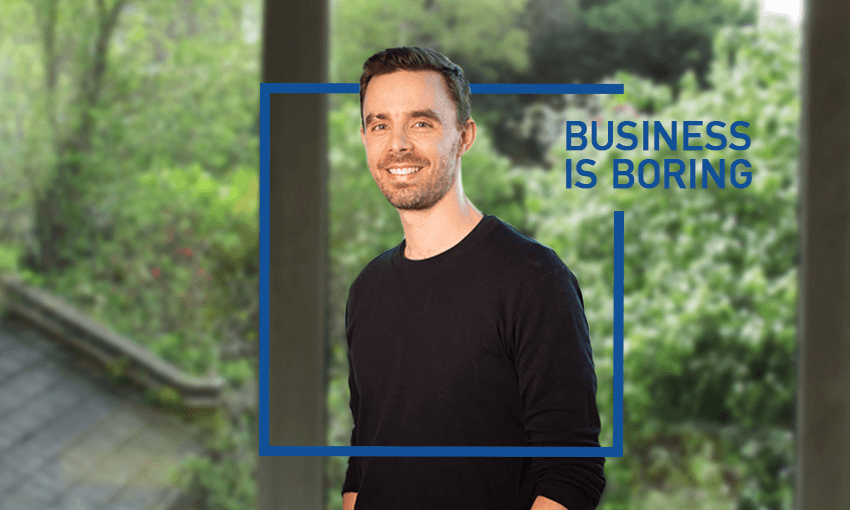Business is Boring is a weekly podcast series presented by The Spinoff in association with Callaghan Innovation. Host Simon Pound speaks with innovators and commentators focused on the future of New Zealand, with the interview available as both audio and a transcribed excerpt. This week he talks to John Henderson, a partner at one of Australasia’s leading VC firms, Airtree.
One thing that we talk about a lot on this show is what it takes to make an idea successful. But one point that doesn’t always get raised, but is perhaps one of the top factors, is getting the access to the right capital at the right time. Not getting access to funds at the right time to grow equals failure. Getting capital that demands you do the wrong things spells trouble. Getting capital and not spending it well also spells trouble.
It is an industry where one win can carry ten losses, and changes in markets, technology and personnel can turn a sure fire bet into a tanker. It’s an area that fascinates. People like the team from A16Z have done a great job in popularising the founder centric VC and approach, and the way some of their influences have been portrayed on shows like Silicon Valley mean that the VC process in pop culture is seen as a big exciting chase.
But what’s the process really like? What kind of people are able to do it? And if you’re a company with a big dream, how do you get a top VC behind you?
This week’s guest is here to help. John Henderson is a partner at one of Australasia’s leading VC firms, Airtree. They have investments in great companies like Canva, Prospa and Joyous, as well as locally-led ventures such as 90 Seconds and Thematic. John came back to Australia after being a founding principal at transatlantic venture firm White Star Capital which invested in well-known companies such as Dollar Shave Club. He got into VC investing by being part of successful companies like Summly and Facebook, and early in his career, management consulting.
To talk about what it’s like and how it works, John joined the podcast.
Either download this episode (right click and save), have a listen below or via Spotify, subscribe through iTunes (RSS feed) or read on for a transcribed excerpt.
There’s a couple of ways people can become VCs. One of the more well-known ones is by being a founder or by being deeply involved with a company that’s run through a VC process. That was your way into it with Summly, wasn’t it?
Sort of. I joined Summly very early in the journey before we launched the product. I was suddenly in a unique company in the sense that our founder Nick D’Aloisio was 16 when I joined Summly, and that came with challenges and benefits. But he was an exceptional young man who built a team around him, attracted VCs and a bunch of high profile of angel investors. When we raised the first round for Summly, [it was at a] time when party rounds were a real thing and we had this who’s who of interesting people behind us: Stephen Fry, Ashton Kutcher, Brian Chesky, Yoko Ono, Rupert Murdoch. It was this remarkable group of people who’d joined to help.
They were all backing this vision at Summly which was [the idea that] we could algorithmically summarise content everywhere and anywhere. This was at the time when smartphones were on the way up and not necessarily ubiquitous yet. So one of the big questions was: how do you consume content that’s designed for a desktop screen on a mobile? Nick had designed a summarisation algorithm which could take content of any length and bring it down to 4-5 sentences.
We started with the news because that’s a great daily use case. You don’t need the summary to be great to get the gist of the news but you want a bit more than the headline. We ended up winning a couple of design awards, raised venture capital from angel investors and then Horizon ventures. The rest is history.
What led you, as someone who was successfully working in a pretty important part of Facebook, to jump to working for a company run by a 16-year-old? That would’ve been quite a big decision to make.
A huge decision. Coming from Bush Campus I had unfinished business with the startup world and aspirations to either start or be part of something from the very beginning and see it through to success. So I always wanted to start something again or join something in the early days.
I think when I met Nick, I just knew there was something special about him… and I just wanted to be part of his story. In Nick, I saw the magnetism, the charisma, the technical capability, the product vision. Every box in my eyes – this was before I was a VC – was ticked as far as thinking ‘this is someone I want to work for’. That’s a criteria I still use today.
So it was a huge decision to join him but you’ve got to take some risks in your life. That was a calculated risk that worked out. But it was really a bet on a person and Nick delivered on that.

